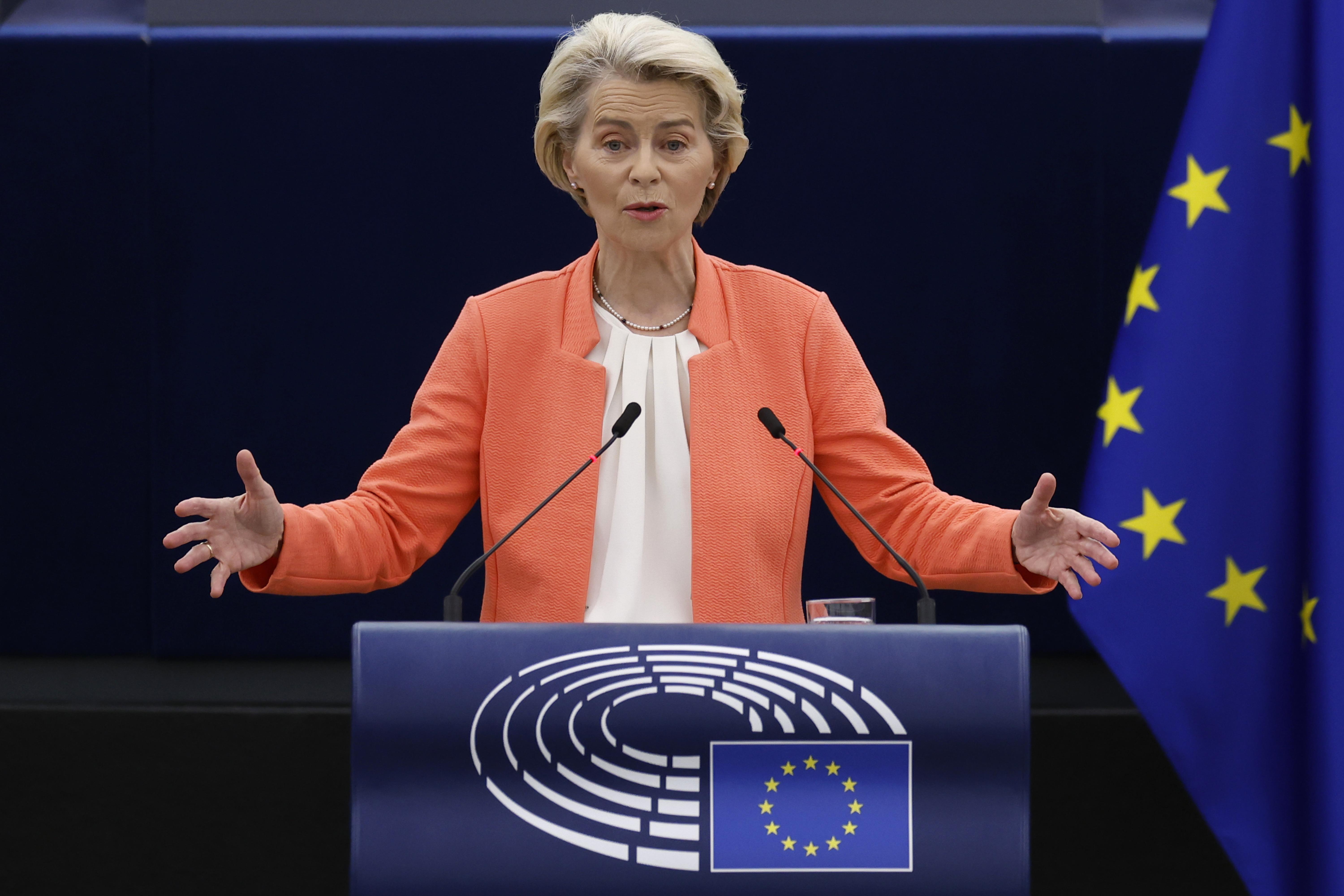Von der Leyen criticized for anti-Beijing comments as Hungarian minister warns of ‘de-risking’
 European Commission President Ursula von der Leyen delivers her annual speech on the state of the European Union and its plans and strategies looking ahead, at the European Parliament, Sept 13, 2023 in Strasbourg, eastern France. (PHOTO / AP)
European Commission President Ursula von der Leyen delivers her annual speech on the state of the European Union and its plans and strategies looking ahead, at the European Parliament, Sept 13, 2023 in Strasbourg, eastern France. (PHOTO / AP)
In her last State of the Union address on Sept 13, European Commission President Ursula von der Leyen touted her achievements and took swipes at China, including announcing the launch of an anti-subsidy probe into Chinese electric vehicles, or EVs.
But her speech drew sharp criticism for being self-congratulatory and failing to mention many key issues critical to the European Union.
Von der Leyen took multiple shots at China in her one-hour speech, accusing China of “unfair trade practices” in the solar industry and criticizing China’s recent export control measures on gallium and germanium.
She then alleged that “global markets are now flooded with cheaper Chinese electric cars” and “their price is kept artificially low by huge state subsidies”, and announced that the commission is launching an anti-subsidy investigation into electric vehicles coming from China.
However, she made no mention of the United States’ Inflation Reduction Act, which has discriminated against foreign-made electric cars, including from the EU. The EU has reacted by adapting its state aid rules and legislative proposals, and is discussing other possible responses.
In a statement, the China Chamber of Commerce to the EU said it was deeply concerned and opposed the EU’s announcement regarding Chinese EVs.
It said the success of Chinese EVs, which are welcomed by European consumers, does not rely on the alleged subsidy.
“We urge the EU to objectively look at China’s EV development and not to resort to unilateral trade tools to block China’s EVs in the EU and raise their costs,” the statement said.
Ryszard Legutko, co-chair of the European Conservatives and Reformists, lashed out in front of von der Leyen.
“Is the EU in better shape today than 15 years ago? The answer is an emphatic no,” he said. “Something is rotten in the State of the Union. There is more than ever instability, tension, and uncertainty.”
Qin Yan, a carbon analyst based in Oslo with financial data provider Refinitiv, said von der Leyen has continued the tone of ‘”de-risking” from China. “This is more of a campaign speech with lots of China bashing than delivering concrete measures regarding the Green Deal.”
Hungary’s Minister of Foreign Affairs and Trade Peter Szijjarto, addressing the Belt and Road Summit 2023 in Hong Kong on Sept 13, said the proposals of European politicians on “decoupling” and “de-risking” with China would hurt Europe.
“What would happen if you cut such ties? You are killing the European economy,” he said, noting the annual trade volume between the EU and China has reached over 800 billion euros ($859 billion).
He told the thousands watching that Europe is in bad shape, to say the least, confronting both security and economic challenges.
Europe is bearing the cost of the Ukraine-Russia conflict as European people are dying, its infrastructure is being ruined, and the economy is suffering huge losses, he said.
“Unfortunately, the answer Europe has given to this conflict proved to be a big mistake, a huge failure,” Szijjarto told the summit, adding that Europe should have isolated this conflict but has instead globalized it.
Europeans should have prevented the conflict but every day higher risks of escalation emerge due to illogical acceptance and following the US. On top of this, Europe has decided to implement a policy based on sanctions, said Szijjarto.
“These sanctions proved to be a total failure,” Szijjarto said. This is because the goals of such sanctions, pressing Russia and ending the conflict, have not been fulfilled, while the competitiveness of the European economy is decreasing day by day, he said.
When it comes to the long-term impact of the conflict, the minister said there is another “very serious risk” as the world is going to be divided into blocs again.
The economic development of Europe had been based on a good combination of highly developed technologies and easily accessible and cheap natural resources from Russia. “But now the ties between the two … are now being cut, one by one,” he said.
Contact the writers at chenweihua@chinadaily.com.cn


